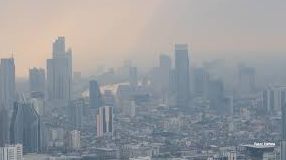The Thai capital battles severe air pollution, prompting unprecedented school closures and government measures.
Severe air pollution in Bangkok forced the closure of 352 schools on Friday, January 24, marking the highest number of closures in the city in five years. Authorities in the Thai capital also introduced a series of measures, including free public transport for a week, in an effort to reduce traffic congestion and combat the smog that has enveloped the city.
This week’s pollution spike is attributed to a combination of seasonal weather conditions, including cold, stagnant air, alongside smoke from agricultural burning and vehicle emissions. The air quality has been so poor that it has led to the closure of more schools than any other time since 2020.
“It’s hard to breathe… I really feel the burn in my throat,” said Benjawan Suknae, a 61-year-old street vendor, commenting on the unhealthy air. She also expressed support for the school closures, believing they could help reduce exposure.
According to the Bangkok Metropolitan Administration, the 352 schools affected represent over 80% of the schools in the city. Previously, over 250 schools had shut down on Thursday as air pollution worsened, while residents were urged to stay home and avoid unnecessary travel.
The concentration of harmful PM2.5 particles – microscopic pollutants that pose serious health risks – had reached 108 micrograms per cubic metre by Friday, a level far exceeding the World Health Organization’s recommended safety threshold of 15 micrograms per cubic metre for an average 24-hour exposure. This has made Bangkok the seventh most polluted major city globally.
In response to the crisis, Interior Minister Anutin Charnvirakul issued a ban on crop stubble burning, a common contributor to the air pollution, with legal consequences for violators. Meanwhile, transport minister Suriya Juangroongruangkit announced that public transport services, including the Skytrain, metro, and bus services, would be free for the next week in an effort to reduce the number of vehicles on the road.
Prime Minister Paetongtarn Shinawatra, who is attending the World Economic Forum in Switzerland, called for even stricter measures, including curbing construction activities in the city and seeking regional cooperation to address cross-border pollution.
Public reaction to the pollution has been widespread, with many advocating for more comprehensive efforts to tackle the root causes of air quality issues. Freelance worker Wisut Kitnarong, 59, suggested that greater awareness and a more robust work-from-home policy might offer some relief.
Cities across Southeast Asia are grappling with similar air quality issues, with Ho Chi Minh and Phnom Penh also ranking high in air pollution levels, as per IQAir’s index.








